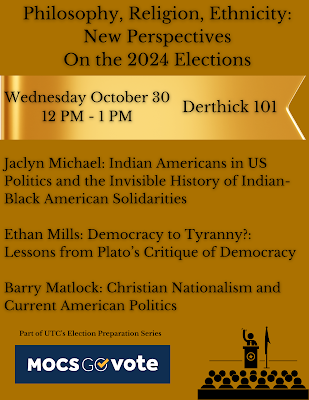This week I'm participating along with two of my colleagues in an event on my campus to promote voting and civic engagement. It's part of a series called Mocs Go Vote ("Mocs" are our mascot here at the University of Tennessee at Chattanooga). Here's the poster for the event.
With the US Presidential election coming up next week, I figured I'd post a version of my talk here on the blog (my fellow Americans eligible to vote can look here for information about how to vote).
What can we learn from a 2300-year-old critique of democracy?
Before I dive into that, it's worth discussing why we should read old philosophy at all. My iPhone was obsolete as soon as I opened the box, so how much can we really learn from someone who died a few hundred years before the Roman Empire was established?
Part of the answer, I think, is that reading old stuff gets you outside your present time and place to ask odd questions and see things from new angles. We often get so wrapped up in our own categories and ways of seeing the world that we miss out on other perspectives. (In this sense, reading old philosophy is similar to my other favorite thing to read: science fiction!)
Plato (428-348/7 BCE) was an ancient Greek philosopher who lived long before there were Democrats and Republicans and a United States. He wrote a lot of dialogues, including the Republic. In this text, "Socrates" as a character has extremely wide-ranging conversations with his friends about the question, "What is justice?" (I often think the Republic itself is almost like a science fiction novel, maybe a dystopian one?).
In Book 8 of the Republic, Socrates and pals discuss the different kinds of constitutions and the souls to which they correspond, with the aristocratic constitution and soul at the top followed by timocracy (rule by honor), oligarchy (rule by the few), democracy, and tyranny in descending order of perfection.
According to Socrates, democracy values freedom “as its finest possession” (562b-c). This creates equality and flattening of hierarchies, and everyone believes all pleasures to be equal. Citizens become overly sensitive to perceived restrictions on freedom (563d). Then a popular leader gains power through democratic means. He punishes his enemies (565c-566a), makes false promises (566d-e), and later cuts off both friends and enemies (567b). In the end, “... he also praises tyranny as godlike…” (568b).
These are just some highlights from several pages of text. The bottom line: Plato doesn't like democracy very much, partly because it inherently devolves into the worst form of government: tyranny.
It's also possible that Plato has a personal beef with democracy: after all, democracy killed his favorite person, Socrates! (See the Godfather meme above!)
We also have to keep in mind that Plato wrote dialogues, and we don't always know exactly what he thought. Even "Socrates" may not represent Plato's real views, especially in a "middle dialogue" like the Republic. I think Plato did this deliberately to keep his readers guessing--and more importantly--thinking for themselves. The point is not to listen to Plato, but to do philosophy for yourself.
I could go on about how this is all part of the fun of reading Plato and how philosophically rich and edifying it is to read Plato. Nothing (not even this blog post!) can replace the experience of sitting down and pondering through the text for yourself.
Alas, I'm supposed to be making contemporary connections. Every time I've read the Republic in the last several years, I've found this section chilling.
I am in no way telling people how to vote here (and I definitely am not doing so in my capacity as an employee of the state of Tennessee!).
But here are just a few contemporary parallels that cause me concern. Make of these things what you will, but I note that I'm not the only person with concerns about all of this.
- What happened at the US Capitol on Jan. 6, 2021. An armed group tried to violently disrupt a democratic election. It boggles my mind that this does not weigh heavy in the minds of all of my fellow Americans.
- Trump v. United States: Supreme Court case granting Presidential immunity. We had a whole revolution almost 250 years ago to prevent unaccountable leaders, and now... this?
- The Trump campaign’s authoritarian rhetoric. It's not just rhetoric, of course; the immigrant bashing has been there ever since Trump first ran for President, not to mention restrictions to reproductive freedom (how can you have a democracy in which much of the population lacks bodily autonomy?), and so much more, including Trump's constant praise of authoritarians around the world.
- The Tennessee State Legislature: “The Tennessee Three” were removed from the legislature in 2023 for speaking out against the Republican super majority. When I visited the state legislature earlier this year as part of my union's lobby day, I saw how this supermajority works in practice: very polite refusals to listen at all. In a state with voter disenfranchisement and one of the lowest voter turnouts in the country, how can we call this a democracy?
- Increasing executive power in US government: partly because Congress is so dysfunctional, we give the executive branch greater and greater powers, which is a problem no matter who is President. So this one is bipartisan! Yay...?
- Rising authoritarianism worldwide (India, Hungary, Brazil, Turkey, etc.). Americans often seem to forget that other countries exist, but they do, and our government has huge effects on the rest of the world (something we Americans should remember when voting). Lots of other countries are also facing deep challenges to democracy and democratic institutions. That "etc." above is doing a lot of work...



No comments:
Post a Comment